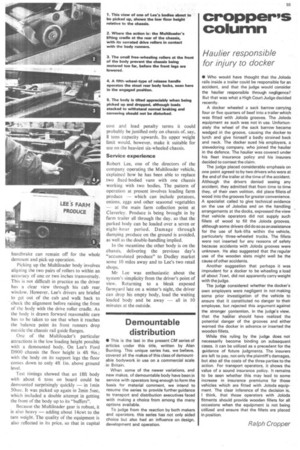cropper's column
Page 57

If you've noticed an error in this article please click here to report it so we can fix it.
Haulier responsible for injury to docker
• Who would have thought that the Joloda rails inside a trailer could be responsible for an accident, and that the judge would consider the haulier responsible through negligence? But that was what a High Court Judge decided recently.
A docker wheeled a sack barrow carrying four or five quarters of beef into a trailer which was fitted with Joloda grooves. The Joloda equipment as such was not in use. Unfortunately the wheel of the sack barrow became wedged in the groove, causing the docker to lurch and give himself a badly strained back and neck. The docker sued his employers, a stevedoring company, who joined the haulier in the defence. The haulier was covered under his fleet insurance policy and his insurers decided to contest the claim.
The judge placed considerable emphasis on one point agreed to by two drivers who were at the end of the trailer at the time of the accident. Although the drivers denied seeing any accident, they admitted that from time to time they, of their own volition, did place fillets of wood into the grooves for greater convenience. A specialist called to give technical evidence on the use of Jolodas and on the handling arrangements at the docks, expressed the view that vehicle operators did not supply such fillets of wood to fill the Joloda grooves, although some drivers did do so as an assistance for the use of fork-lifts within the vehicle, particularly three-wheeled trucks. The fillets were not inserted fur any reasons of safety because accidents with Joloda grooves were unknown. He also suggested that the regular use of the wooden slats might well be the cause of other accidents.
Another suggestion that perhaps it was imprudent for a docker to be wheeling a load of about 7cwt, did not apparently carry weight with the judge.
The judge considered whether the docker's own employers were negligent in not making some prior investigation of the vehicle to ensure that it constituted no danger to their employee, but .rejected this argument against the stronger contention, in the judge's view, that the ha4lier should have realized the potential danger of the grooves and either warned the docker in advance or inserted the wooden fillets.
While this ruling by the judge does not necessarily become binding on subsequent cases, it can be utilized as a precedent for the guidance of future judgments. The insurers are left to pay, not only the plaintiff's damages, but also all the costs of the three parties to the action. For transport operators, it shows the value of a sound insurance policy. It remains to be seen whether this may lead to some increase in insurance premiums for those vehicles which are fitted with Joloda equipment. The clear inference of the decision is. I think, that those operators with Joloda fitments should provide wooden fillets for all occasions when the equipment is not being utilized and ensure that the fillets are placed in position.








































































































